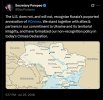Edited to add: Was compiling this while
@NoParty made the above two posts; I've inadvertently covered some of the same ground).
They (Biden and europe) waited way too long to try making a deal,
I don't think the countries / politicians supporting Ukraine were angling for a deal; they were hoping that the costs to Russia- economically, politically and in terms of casualties- would be sufficient to cause the Russian government to end its operations in Ukraine, or at least declare a (real) ceasefire;
then negotiations might have begun.
Ultimately, most wars are settled or followed by negotiations, but not all.
No-one did a deal with Nazi Germany, and in reality Imperial Japan had no choice: They successfully negotiated that the Emperor would not be personally held to account (whether it was wise for the US to accept this is something historians still argue over) but otherwise accepted a total surrender and an allied (essentially American) occupation force with control over all aspects of government.
The Battle of Yorktown, which resulted in the victory of the American Continental Army over the British forces and their German allies, and in effect the founding of the United States of America, was conclusive. Although the terms of surrender were negotiated, there was no prospect of continued British action in the 13 colonies at any scale; a fleet sent to reinforce the British arrived too late, was outnumbered by French warships, and turned away. The Americans did not have to make a deal.
(Incidentally, not knowing much about the Revolutionary War/ AWI, had a quick read about Yorktown on Wikipedia. Surprised at the relatively small numbers involved and the relatively modest number of casualties in an event of such pivotal importance in world history, and that French troops outnumbered Americans,
https://en.wikipedia.org/wiki/Siege_of_Yorktown).
At the Battle of Điện Biên Phủ in 1954, Viet Minh (Communist Vietnamese) forces decisively defeated a large French force.
Again, although there were later negotiations and international accords, it was evident that the Viet Minh had won and that further French action was untenable- to a degree it didn't matter what politicians and diplomats agreed months down the line, the situation "on the ground" had largely been decided.
It seems unlikely that the current Ukrainian government and its allies (including the USA) ever believed that the Ukrainian forces could inflict a decisive defeat on Russian forces, though there might have been a brief gleaming of hope when initial Russian gains- particularly in the country north of Kiev- were rapidly reversed. There would be no Ukrainian Yorktown.
Instead, the underlying strategy was probably to continue resistance as effectively as possible, aiming to impose mounting financial and military costs on Russia.
The 1973 US end of combat operations in Vietnam and the Soviet withdrawal from Afghanistan in 1989 were not caused by defeat in battle, but by a perception by the leaderships of the USA and Russia respectively that the costs of continued warfighting outweighed any possible benefits.
The North Vietnam forces and Viet Cong were able to continue their eventually successful campaigns due to large-scale military support from the Soviet Union (and to some extent China); the Afghan Mujahedeen groups fighting the Soviets were supported with arms and cash mainly from the USA, Pakistan and several Arab states.
On a smaller scale, the British-French 1956 seizure of the Suez Canal was a military success, but (humiliatingly for the governments of both those nations) had to be reversed because of strong opposition and the possibility of financial sanctions from the USA, hostility from the USSR and almost universal condemnation by other nations- the invasion was seen as unjustified and a blatant disregard of Egyptian sovereignty.
Nations involved in warfare rarely say "Well, if the enemy keeps fighting perhaps we'll let them have this bit of our country",
and whatever the realities, their allies don't normally say such things in public: How do you motivate young soldiers to defend territory that their leaders, or their supposed friends, say might be given to the enemy?
Such declarations embolden the aggressor: "Keep fighting and we will get some of what we want,
our enemy's allies have said as much."
This is at least partly why many European (and other traditionally pro-American countries, such as Canada, Australia, more discretely Japan, Taiwan) are so alarmed at some of the statements made by the current US administration; they appear to encourage Russia by saying,
before any negotiations or concessions by that country, "you will get to keep some of what you've taken."
Not even "We might recognise your claims in time if there is a ceasefire now, you accept Ukraine has a right to exist, you enter meaningful negotiations
and you return the thousands of Ukrainian children you have abducted."
Today, we have this news:
External Quote:
Trump criticises Zelensky over refusal to accept Russian control of Crimea
US President Donald Trump has accused Volodymyr Zelensky of harming peace negotiations, after the Ukrainian president said Kyiv would not recognise Russian control of Crimea.
Writing on Truth Social, Trump claimed a deal to end the war was "very close", but that Zelensky's refusal to accept US terms "will do nothing but prolong" the conflict.
Earlier, US Vice-President JD Vance laid out the US vision for a deal, saying it would "freeze the territorial lines [...] close to where they are today".
BBC News, 23 April 2025, 04:28 BST, Brandon Drenon
https://www.bbc.co.uk/news/articles/c78jx68d922o
Both the President and VP seem to be saying, "Russia can keep what it has seized by force", and that anyone saying otherwise is obstructing a "deal". Including the elected President of a nation that was attacked by Russia, where tens, possibly a hundred thousand or more people have been killed by Russia's unprovoked and illegal actions, and while thousands of Ukrainian children are held, with no contact with their families, in Russia.
It is, at least to me, astonishing.


